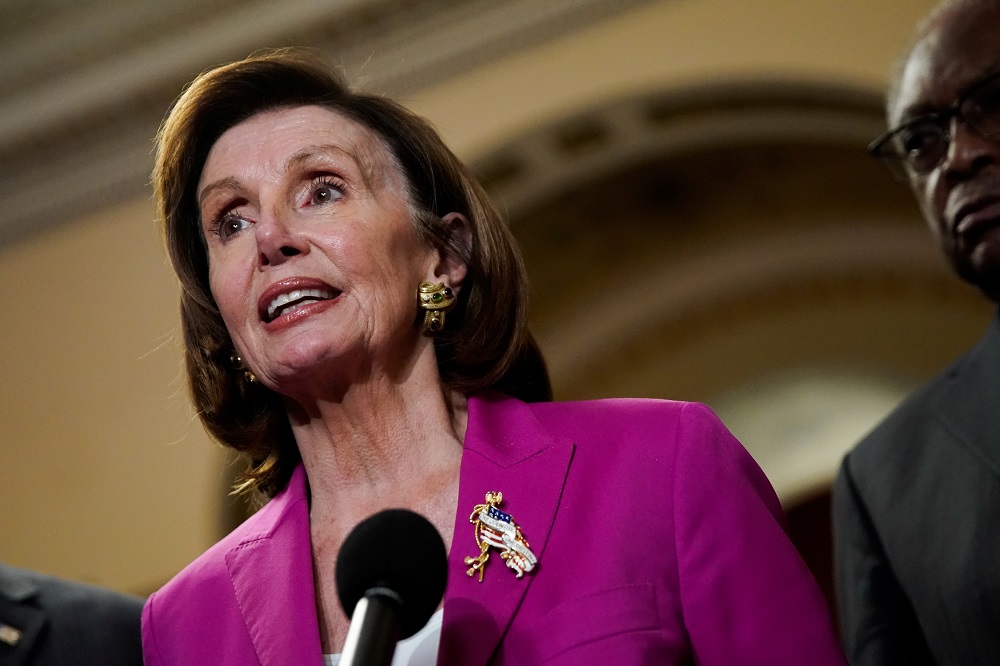House Speaker Nancy Pelosi delivers remarks at the US Capitol in Washington November 5, 2021. — Reuters pic
WASHINGTON, Nov 6 — US Democrats dropped plans to push President Joe Biden’s sweeping US$1.75 trillion (RM7.28 trillion) social-policy and climate-change bill through the House of Representatives on Friday, as lingering divisions once again waylaid the ambitious package.
Party leaders said they would move forward with a vote on a US$1 trillion infrastructure bill to revamp the nation’s roads, bridges and airports — another key pillar of Biden’s domestic agenda.
But it was not clear whether that vote would succeed. The leader of the Democrats’ progressive wing said her group would not vote for that bill until the party was also ready to vote on the larger one.
It all amounted to a chaotic setback for Biden’s Democrats, who have been eager to show progress after a week in which off-year electoral defeats raised new questions about the party’s appeal to voters.
“Welcome to my world. This is the Democratic Party,” House Speaker Nancy Pelosi told reporters after hours of closed-door negotiations. “We are not a lockstep party.”
Pelosi had planned to hold a vote on both bills on Friday, but action ground to a halt after centrist Democrats said they wanted to see a nonpartisan cost estimate for the social-policy and climate-change bill. That estimate, prepared by the Congressional Budget Office, could take weeks to complete.
Pelosi teed up a procedural vote on the package but said final passage may still be weeks off.
Representative Pramila Jayapal, leader of the 95-member progressive caucus, rejected the idea of voting on the infrastructure bill without knowing whether the six centrist holdouts would ultimately support the social spending package.
“If our six colleagues still want to wait for a CBO score, we would agree to give them that time — after which point we can vote on both bills together,” she said in a statement.
Weeks of bickering between moderate and progressive Democrats have held up the bills. Biden on Friday for the first time publicly called on the House to vote on the bills today.
“I’m asking every House member — member of the House of Representatives — to vote ‘yes’ on both these bills right now,” the Democratic president said.
The two pieces of legislation include the biggest upgrade of America’s roads, bridges and airports in a generation and the largest expansion of social programmes since the 1960s.
An affirmative vote would bolster the credibility of Biden’s pledge to halve US greenhouse gas emissions from 2005 levels by 2030 during the UN climate conference taking place in Glasgow, Scotland.
Aim to move forward
The party is eager to show it can move forward on the president’s agenda and fend off Republicans in the 2022 midterm elections, when control of the House and Senate will be on the line.
The House and Senate are both due to be out next week, which leaves them little time to meet the goal of passing the measures by Thanksgiving on November 25. Congress also faces looming December 3 deadlines to avert a politically embarrassing government shutdown and an economically catastrophic default on the federal government’s debt.
With razor-thin majorities in Congress and a united Republican opposition, Democrats need unity to pass legislation.
The infrastructure bill, which passed the Senate Republican votes, would fund a massive upgrade of America’s roads, bridges, airports, seaports and rail systems, while also expanding broadband internet service.
The “Build Back Better” package includes provisions on child care and preschool, eldercare, healthcare, prescription drug pricing and immigration.
Republicans uniformly oppose that legislation, casting it as a dramatic expansion of government that would hurt businesses.
“This is potentially a very black day for America,” said Republican Representative Glenn Grothman, who characterised the legislation’s child-care and preschool provisions as a “Marxist” effort to have the federal government raise children.
The nonpartisan US Joint Committee on Taxation estimates the social-spending bill would raise US$1.48 trillion in new tax revenue over the next decade, short of its US$1.75 trillion cost.
Pelosi and other top Democrats say that fails to account for increased tax enforcement and savings from lower prescription drug prices. — Reuters

